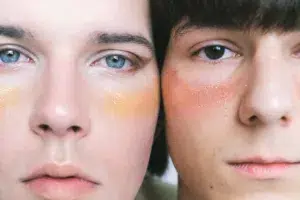Empowerment and Identity Through Makeup

Makeup is more than just a way to enhance one’s appearance; it’s a powerful tool that can evoke emotions, boost confidence, and express individuality. The psychology of makeup delves into the profound impact it has on our minds and self-perception. Join us on this exploration of the transformative world of makeup, where colors, brushes, and creativity merge to craft a beautiful and empowered self.
The Art of Self-Expression
From ancient civilizations to modern society, makeup has played a significant role in human culture. It’s a form of self-expression that transcends language barriers. People use makeup to convey emotions, beliefs, and even their personalities.
Confidence Booster
One of the most remarkable aspects of makeup is its ability to boost self-confidence. The simple act of applying makeup can empower individuals to face the world with a renewed sense of self-assuredness. Makeup allows people to highlight their favorite features, conceal imperfections, and embrace their unique beauty.
Research has shown that wearing makeup can increase self-esteem and enhance mood. It’s not about masking one’s true self but rather accentuating one’s best attributes. When we feel good about our appearance, it can positively impact our overall self-image and mental well-being.
Creative Outlet
Makeup is an art form in its own right. It offers a canvas where individuals can experiment, create, and push boundaries. Makeup artists worldwide use their skills to produce awe-inspiring looks that challenge norms and redefine beauty standards. Whether it’s experimenting with bold eyeshadows, intricate eyeliner designs, or avant-garde lip colors, makeup provides a platform for boundless creativity.
Personal Identity
Makeup can also be a reflection of personal identity. Some individuals use makeup to convey their cultural heritage, celebrate special occasions, or express their gender identity. For many, it’s a way to feel more connected to their roots or to showcase their unique style.
The Psychology Behind Makeup Choices
The colors and products we choose for our makeup routines can reveal intriguing insights into our emotional state, personality, and even our aspirations.
The Power of Color
Color psychology plays a significant role in makeup choices. Different shades can evoke various emotions and create different impressions. For example:
- Red: Bold and confident
- Pink: Playful and youthful
- Nude: Natural and understated
- Bold Eyeliner: Expressive and assertive
- Smoky Eye: Mysterious and alluring
- Glowing Skin: Radiant and healthy
Understanding the psychology of color allows individuals to select makeup that aligns with their desired mood and message.
The Ritual of Transformation
The process of applying makeup can be therapeutic and meditative for many. It’s a ritual that provides a sense of control and allows individuals to transform themselves both physically and emotionally. As each brushstroke or swipe of lipstick occurs, it’s an opportunity to focus on the present moment, embracing self-care and self-love.
The Influence of Media and Society
The media, advertising, and societal beauty standards have a profound impact on makeup choices. Trends set by celebrities, influencers, and fashion icons often drive makeup choices. Social media platforms like Instagram and TikTok have accelerated makeup trends and created a global community of beauty enthusiasts.
However, it’s crucial to remember that makeup should be a form of self-expression rather than a tool to conform to societal expectations. It’s an individual choice, and makeup lovers should feel free to explore and embrace their unique style.
Makeup as a Form of Empowerment
Beyond aesthetics, makeup can be a source of empowerment for individuals. It’s a way to take control of one’s appearance, boost self-esteem, and challenge societal norms.
Breaking Stereotypes
Makeup can challenge traditional gender norms and stereotypes. It’s not limited to one gender or age group; it’s a form of self-expression available to everyone. Men, women, and non-binary individuals alike can use makeup to showcase their identity and creativity.
Embracing Imperfections
Makeup doesn’t have to conceal imperfections; it can celebrate them. The rise of “imperfect beauty” movements encourages people to embrace their unique traits, such as freckles, scars, and birthmarks. Makeup can be a tool to highlight these features rather than hide them.

Cultural and Historical Significance
Makeup has played a significant role in history and culture. From ancient Egyptian kohl eyeliner to the red lips of the suffragettes, makeup has been used to make political statements and celebrate cultural heritage. It’s a way to connect with the past and express pride in one’s roots.
The Balance of Inner and Outer Beauty
In the realm of beauty, it’s important to strike a balance between enhancing external features and nurturing inner well-being. Makeup should complement, not replace, one’s self-esteem and self-acceptance. True beauty stems from confidence, kindness, and self-love.
Makeup and Mental Health
While makeup can undoubtedly boost confidence, it’s essential to remember that true beauty comes from within. Makeup should not be used as a crutch to mask insecurities or as a substitute for self-care. It’s a tool to enhance one’s appearance, but it cannot replace the importance of mental health, self-acceptance, and self-love.
The psychology of makeup is a fascinating journey into the complex interplay between aesthetics, emotions, and identity. Makeup is more than a product; it’s an art form that empowers individuals to express themselves, boost their confidence, and challenge societal norms. By understanding the psychology behind makeup choices, we can embrace the transformative power of beauty while fostering a deeper connection with our inner selves. Remember, makeup should be a celebration of individuality, creativity, and self-love, allowing each person to shine in their unique way.

